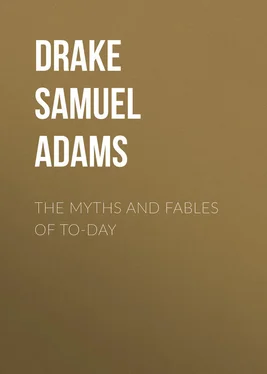Samuel Drake - The Myths and Fables of To-Day
Здесь есть возможность читать онлайн «Samuel Drake - The Myths and Fables of To-Day» — ознакомительный отрывок электронной книги совершенно бесплатно, а после прочтения отрывка купить полную версию. В некоторых случаях можно слушать аудио, скачать через торрент в формате fb2 и присутствует краткое содержание. Жанр: Старинная литература, foreign_antique, foreign_prose, на английском языке. Описание произведения, (предисловие) а так же отзывы посетителей доступны на портале библиотеки ЛибКат.
- Название:The Myths and Fables of To-Day
- Автор:
- Жанр:
- Год:неизвестен
- ISBN:нет данных
- Рейтинг книги:5 / 5. Голосов: 1
-
Избранное:Добавить в избранное
- Отзывы:
-
Ваша оценка:
- 100
- 1
- 2
- 3
- 4
- 5
The Myths and Fables of To-Day: краткое содержание, описание и аннотация
Предлагаем к чтению аннотацию, описание, краткое содержание или предисловие (зависит от того, что написал сам автор книги «The Myths and Fables of To-Day»). Если вы не нашли необходимую информацию о книге — напишите в комментариях, мы постараемся отыскать её.
The Myths and Fables of To-Day — читать онлайн ознакомительный отрывок
Ниже представлен текст книги, разбитый по страницам. Система сохранения места последней прочитанной страницы, позволяет с удобством читать онлайн бесплатно книгу «The Myths and Fables of To-Day», без необходимости каждый раз заново искать на чём Вы остановились. Поставьте закладку, и сможете в любой момент перейти на страницу, на которой закончили чтение.
Интервал:
Закладка:
A mare’s tail in the morning is another sure presage of foul weather. This consists in a long, low-hanging streak of murky vapor, stretching across a wide space in the heavens, and looking for all the world like the trailing smoke of some ocean steamer, as is sometimes seen long before the steamer heaves in sight. The mare’s tail is really the black signal of the advancing storm, drawn with a smutty hand across the fair face of the heavens. Hence the legend, —
“Mackerel sky and mare’s tails
Make lofty ships carry low sails.”
If the hedgehog comes out of his hole on Candlemas Day, 4 4 Candlemas Day (2 February) is observed as a festival day by the Roman Catholics, and still holds a place in the calendar of the Episcopal Church. It is kept in memory of the purification of the Virgin, who presented the infant Jesus in the Temple. A number of candles were lighted, it is said in memory of Simeon’s song (Luke ii, 32), “A light to lighten the Gentiles.” Hence the name of Candlemas. Edward VI. forbade the practice of lighting the churches in 1548.
and sees his shadow, he goes back to sleep again, knowing that the winter is only half over. Hence the familiar prediction: —
“If Candlemas day is fair and clear,
There’ll be two winters in the year.”
The same thing is said of the bear, in Germany, as of the hedgehog or woodchuck.
The Germans say that the badger peeps out of his hole on Candlemas Day, and if he finds snow on the ground, he walks abroad; but if the sun is shining, he draws back into his hole again. At any rate, the habits of this predatory little beast are considered next to infallible by most country-folk in New England.
A similar prediction carries this form: On Candlemas Day just so far as the sun shines in, just so far will the snow blow in.
“As far as the sun shines in on Candlemas Day
So far will the snow blow in before May:
As far as the snow blows in on Candlemas Day
So far will the sun shine in before May.”
From these time-honored prophecies is deduced the familiar warning: —
“Just half your wood and half your hay
Should be remaining on Candlemas Day.”
An old Californian predicted a dry season for the year 1899, because he had noticed that the rattlesnakes would not bite of late, a never failing sign of drought which few, we fancy, would feel inclined to put to the test.
An unusually cold winter is indicated by the greater thickness of apple skins, corn husks, and the like.
The direction from which the wind is blowing usually indicates what the weather will be for the day, – wet or dry, hot or cold, – but here is a rhymed prediction which puts all such prophecies to shame: —
“The West wind always brings wet weather
The East wind wet and cold together,
The South wind surely brings us rain,
The North wind blows it back again.
If the sun in red should set,
The next day surely will be wet;
If the sun should set in gray,
The next will be a rainy day.”
This falls more strictly in line with many of the so-called signs which, like the old woman’s indigo, if good would either sink or swim, she really didn’t know which; or like the predictions of the old almanac makers, who so shrewdly foretold rain in April, and snow in December.
IV
SIGNS OF ALL SORTS
“Authorized by her grandam.” — Macbeth.
If you sneeze before breakfast, you will have company before dinner.
If you pick the common red field lily, it will make you freckled.
A spark in the candle denotes a letter in the post office for you.
To hand a cup with two spoons in it to any one, is a sign of a coming wedding in the family.
If a cat is allowed to get into bed with an infant, the child will be strangled by the animal sucking its breath, or by lying across its chest.
If my right ear burns, some one is talking about me, hence the familiar saying, “I’ll make his ears tingle for him.” Pliny records this omen. Also in “Much Ado About Nothing,” Beatrice exclaims, “What fire is in mine ears!”
When the right ear itches or burns, the person so affected will shortly cry; when it is the left, he will laugh. One version runs in this wise: —
“Left or right
Good at night.”
Late blossoming of vines or fruit trees will be followed by much sickness. This probably rests upon the theory that a mild autumn will be a sickly autumn, which is the same thing as saying that unseasonable weather is pretty sure to be unwholesome weather. The same prediction is expressed by the old saying that “A green Christmas makes a fat church-yard.” Both predictions agree with the observations of medical science.
A spoon in the saucer and another in the cup denote that the person using them will be a spendthrift, and probably come to want; but two spoons to one dish of ice-cream denote foresight and true thrift.
“Sing before you eat,
Cry before you sleep.”
Or, if you sing before breakfast, you will cry before supper.
Pull out one gray hair, and ten will grow in its place.
Should you happen to let drop your scissors, or other sharp instrument, and they should stick upright in the floor, it is a sign that you will soon see a stranger. 5 5 See the ominous import of this farther on.
Dropping the dishcloth has the same significance.
Two cowlicks, growing on the same person’s head, denote that he will eat his bread in two kingdoms – that is, be a traveller in foreign parts.
Should a cow swallow her cud, the animal will die, unless another cud be immediately given her.
Hard-hack 6 6 The white and purple spiræa.
was thus named by the early colonists, who declared that the tough stalk turned the edge of the mower’s scythe.
If you see a white horse, you will immediately after see a red-haired woman.
Bubbles gathering on top of a cup of coffee or chocolate indicate, if they cluster at the middle, or “form an island” in prophetic parlance, money coming to you. If, however, the bubbles gather at the sides of the cup, you will not get the money.
Two chairs, placed by accident back to back, are a sign of a stranger.
Coming in at one door, and immediately going out at another, has the same meaning.
A tea-stem floating in the tea-cup – a common thing before the day of tea-strainers – also foreshadows the coming of a stranger. Old people say “you must butter his head and throw him under the table, if the charm is to work.” A tea-leaf means the same thing, its length denoting whether the stranger will be short or tall.
To let fall your fork is a sure sign that you are going to have a caller on that very evening, or, as the girls declare, have “a beau.” A very estimable lady said when telling me this, that when she was a young girl she never had that accident happen to her that she did not immediately get ready for a caller; and she added that seldom, or never, was this sign known to fail.
If a young girl has the nosebleed, it is a sign that she is in love. 7 7 For the ill omens of nosebleed, see Chapter ix.
If your nose itches you will either
“See a stranger,
Kiss a fool,
Or be in danger.”
If your left hand itches, you will shortly receive money; if it is the right hand, get ready to shake hands with a stranger.
A ringing or “dumb-bell” in the ear denotes that you may expect startling news of some sort.
A swarm of bees in June is worth a silver spoon.
Four persons meeting in a crowded place and shaking hands cross-wise, is a sign that one of the party will be married within the year.
Читать дальшеИнтервал:
Закладка:
Похожие книги на «The Myths and Fables of To-Day»
Представляем Вашему вниманию похожие книги на «The Myths and Fables of To-Day» списком для выбора. Мы отобрали схожую по названию и смыслу литературу в надежде предоставить читателям больше вариантов отыскать новые, интересные, ещё непрочитанные произведения.
Обсуждение, отзывы о книге «The Myths and Fables of To-Day» и просто собственные мнения читателей. Оставьте ваши комментарии, напишите, что Вы думаете о произведении, его смысле или главных героях. Укажите что конкретно понравилось, а что нет, и почему Вы так считаете.












